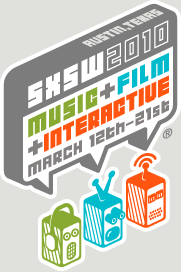Both Serious and (I guess) Frivolous ARGs and PGs teach collaboration strategies and collective intelligence skills. Instead of merely challenging players to solve a gamemastered puzzle, Serious ARGs relinquish a great deal of narrative control to players, and encourage the development of a "collective imagination" among them.
Collective intelligence is useful, pragmatic; collective creativity is visionary. The former is what makes Pandora and Amazon's "Other Customers Bought..." functions work; the latter is what might save our collective ass one of these days.

Here's an item I wrote for the Boston Globe's Ideas section in August 2005 about Jane McGonigal's Ministry of Reshelving project — in retrospect, I think it was her first step away from doing ARGs as PR stunts for video games, and towards what she does now.
Earlier this summer, Jane McGonigal and three dinner companions were chatting about doublespeak, censorship, and surveillance when someone idly commented that George Orwell's dystopian novel 1984 should be reclassified as Non-Fiction, or even filed under Current Events. "Five seconds later, I said, 'Wait — we could actually do that,'" recounts McGonigal. So last Monday she took the lead in launching the Ministry of Reshelving project, an ambitious, opt-in performance piece whose goal it is to secretly reshelve 1,984 copies of Orwell's book in bookstores in all 50 states.
Though such an undertaking sounds daunting, it's child's play for McGonigal, a doctoral candidate in performance studies at UC-Berkeley who earns a living working as a designer and "puppetmaster" for 42 Entertainment, an Emeryville, Calif.-based outfit that creates elaborate "alternate reality games" — played by thousands via chatroom, cell phone, e-mail, even billboards and want ads — in order to drum up excitement for various new products. But McGonigal's true passion, she said via e-mail from San Francisco, is "making games that give people a platform for changing social norms and public policy." As of this writing, she reports, some 55 "ministers" — from California, New York, Idaho, Kentucky, Wisconsin, North Carolina, and a half dozen other states — have relocated over 100 copies of 1984. Evidence of these hijinks is being posted around the clock to the photo-sharing website Flickr.
Is Boston behind the curve? By no means! On Thursday morning, McGonigal said, a Bostonian "minister" informed her that a copy of 1984 had just been moved from the Fiction section of the Borders in Downtown Crossing to the Political Science section, where it was reshelved next to a book titled Inside the Mind of Bush.





I love this project. 1984 is more relevant than ever. It would be wonderful if the Ministry of Reshelving could also tweak the "recommendations" on Amazon, like recommending 1984 to folks who buy *Inside the Mind of Bush*.
ReplyDeleteThis comment has been removed by the author.
ReplyDeleteI think that Howard Rheingold called product recommendations based on user input "reputation systems."
ReplyDeletehttp://en.wikipedia.org/wiki/Reputation_system
Hang on, the product recommendations are called recommendation systems.
ReplyDeletehttp://en.wikipedia.org/wiki/Recommendation_system
We need to discuss recommendation systems. Because, for some futurists and techno-enthusiasts, from Kevin Kelly to Steven Johnson, they're proof that the Hive Mind is a good thing. But... is the Hive Mind really a good thing?
ReplyDeleteWell, the question really is, is art democratic? And should it be? The arc of art up to this point in time, with perhaps a small blip in the mid century has been benevolent dictatorship. That's the issue, then, isn't it? Do our social ideals mesh well with our artistic ideals?
ReplyDeleteHakim Bey writes that "in sleep we dream of only two forms of government -- anarchy & monarchy," which strikes me as very true, and apropos of this discussion. In our dreams, we're either the ruler of all we survey or we're entirely on our own; who dreams of representative democracy, or collective decision-making? To the extent that art is an expression of the artist's soul, or inner self, or whatever, it can't be democratic, then. However, that's only one definition of art.
ReplyDelete